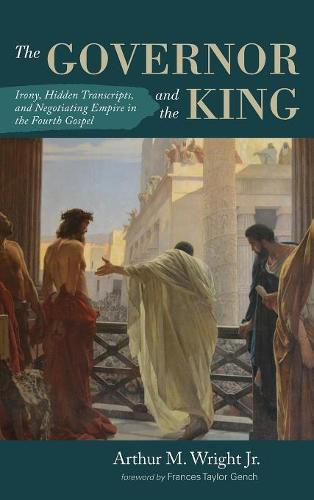Readings Newsletter
Become a Readings Member to make your shopping experience even easier.
Sign in or sign up for free!
You’re not far away from qualifying for FREE standard shipping within Australia
You’ve qualified for FREE standard shipping within Australia
The cart is loading…






This title is printed to order. This book may have been self-published. If so, we cannot guarantee the quality of the content. In the main most books will have gone through the editing process however some may not. We therefore suggest that you be aware of this before ordering this book. If in doubt check either the author or publisher’s details as we are unable to accept any returns unless they are faulty. Please contact us if you have any questions.
The Fourth Gospel is a political document. Although it has often been interpreted primarily as a spiritual gospel, it has much to offer readers engaged in the difficult task of negotiating life lived under the dominion of empire, whether in the first or twenty-first century. This book gives careful attention to the political dimensions of the Gospel’s Passion Narrative, including the arrest scene (18:1-12), the Roman show trial (18:28–19:16), and the crucifixion and burial of Jesus (19:16-40). It employs James C. Scott’s model of hidden transcripts and examines the Fourth Gospel’s use of irony as it seeks to understand the political dimensions of the Fourth Gospel and its relationship to the Roman Empire. In this book, Wright argues that the Passion Narrative displays part of a Johannine hidden transcript that resists, contests, and at times mimics elements of Roman imperial power. The Gospel mocks the representatives of Rome, including Pilate, the Roman soldiers, and the Jewish authorities, eroding confidence in the empire and its agents. It also subverts Roman imperial claims of dominance, authority, and power. As such, the Fourth Gospel fosters an alternative worldview and community, one centered on faith in the sovereignty of Jesus and Israel’s God.
$9.00 standard shipping within Australia
FREE standard shipping within Australia for orders over $100.00
Express & International shipping calculated at checkout
This title is printed to order. This book may have been self-published. If so, we cannot guarantee the quality of the content. In the main most books will have gone through the editing process however some may not. We therefore suggest that you be aware of this before ordering this book. If in doubt check either the author or publisher’s details as we are unable to accept any returns unless they are faulty. Please contact us if you have any questions.
The Fourth Gospel is a political document. Although it has often been interpreted primarily as a spiritual gospel, it has much to offer readers engaged in the difficult task of negotiating life lived under the dominion of empire, whether in the first or twenty-first century. This book gives careful attention to the political dimensions of the Gospel’s Passion Narrative, including the arrest scene (18:1-12), the Roman show trial (18:28–19:16), and the crucifixion and burial of Jesus (19:16-40). It employs James C. Scott’s model of hidden transcripts and examines the Fourth Gospel’s use of irony as it seeks to understand the political dimensions of the Fourth Gospel and its relationship to the Roman Empire. In this book, Wright argues that the Passion Narrative displays part of a Johannine hidden transcript that resists, contests, and at times mimics elements of Roman imperial power. The Gospel mocks the representatives of Rome, including Pilate, the Roman soldiers, and the Jewish authorities, eroding confidence in the empire and its agents. It also subverts Roman imperial claims of dominance, authority, and power. As such, the Fourth Gospel fosters an alternative worldview and community, one centered on faith in the sovereignty of Jesus and Israel’s God.